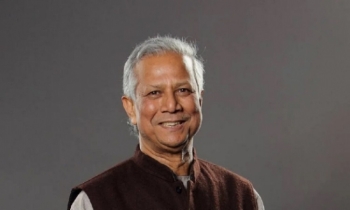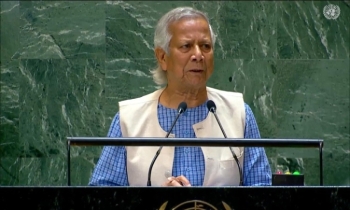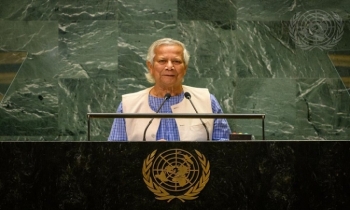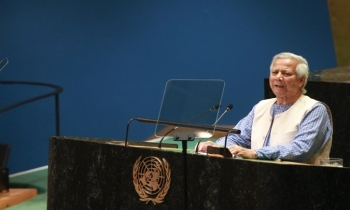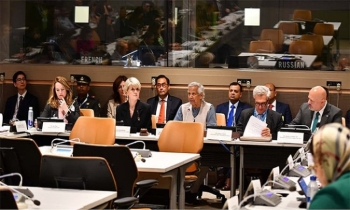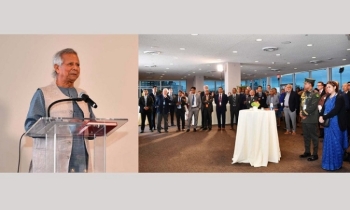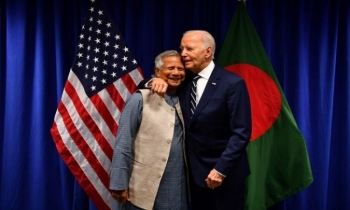Energy sector holds huge cooperation potential between Nepal and Bangladesh: Envoy
|| BusinessInsider

Photo: Collected
Nepalese Ambassador to Bangladesh Ghanshyam Bhandari on Thursday said his country sees huge potential to cooperate with Dhaka in five key areas including in the energy sector setting milestones in bilateral and sub-regional cooperation.
“We are encouraged by the decision of the government of India to facilitate the first trilateral power transaction from Nepal to Bangladesh, through the Indian grid with an export of upto 40 MW. This is just a baby step and a symbolic one. But this will be a huge milestone to kick start a new drive for our bilateral and, in fact, the sub-regional cooperation in energy,” he said.
In addition, the ambassador said, talks are also underway for the joint investment in 683 MW Sunkoshi III hydropower project in Nepal.
“I understand Bangladesh authorities are engaged with GMR Company of India in finalizing the deal for 500 MW of electricity from Upper Karnali,” he said.
The Nepalese ambassador was delivering a keynote speech at Cosmos Dialogue titled “Bangladesh-Nepal Relations: Prognosis for the Future” in the city which was organized as part of “Ambassadors' Lecture Series” by Cosmos Foundation.
Former Bangladesh High Commissioner to India and Ambassador to the United States and Honorary Emeritus Advisor, Cosmos Foundation Tariq A Karim chaired the discussion while Cosmos Foundation Vice President Masud Khan delivered welcome and closing remarks.
Former Secretary, Ministry of Foreign Affairs Sabbir Ahmed Chowdhury, former Principal Secretary to Prime Minister of Nepaql Hari Sharma, Dhaka University International Relations Department Prof Lailufar Yasmin and Assistant Professor, Department of Economics, East West University Parvez Karim Abbasi, among others, spoke at the symposium. Cosmos Foundation Chairman Enayetullah Khan was also present.
The envoy said Nepal’s hydropower potential and Bangladesh’s increasing energy needs is a much-talked about subject.
“Currently, Nepal has an energy surplus. But, what we are producing now is just over 5 percent of what is economically viable. This means, if fully realized, Nepal’s hydropower can make tremendous contributions to the clean energy solutions of South Asia,” said the ambassador.
Tariq Karim said if there is one factor which will determine the future of Bangladesh-Nepal relations; it is to cooperate in the energy sector between the two countries.
Connectivity
Ambassador Bhandari said energy trade, or any other aspect of economic engagements for that matter, will not be possible without connectivity.
“Connectivity- both in the physical and digital sphere- and through land, air and water is the beating heart of bilateral, regional, and sub-regional cooperation,” he said.
Currently, two airlines – Biman Bangladesh and Himalaya Airlines – are operating 10 direct flights per week between Kathmandu and Dhaka.
The movement of goods and people between our two countries is done mostly through Banglabadha and Burimari land ports.
“We thank the Government of Bangladesh for the offer to use port facilities at Mongla and Chittagong for Nepal’s trade with the third countries,” said the envoy.
Talking about sub-regional connectivity, the negotiations on the movement of cargo and passenger vehicles under the BBIN framework are underway, he said.
Successful conclusion of the negotiations, by addressing each other’s concerns, if any, will be a significant milestone towards achieving seamless road connectivity in the sub-region, said the envoy.
Talking about digital connectivity, he said it is one of the emerging frontiers. “IT sector is flourishing both in Nepal and Bangladesh. We need to explore this new area, promote collaboration, and enhance digital connectivity.”
Tourism
Bhandari said historically tourism and people-to-people exchanges have been a strong connecting thread between the two countries.
“Our two countries offer unique and diverse touristic products- be it in terms of Nepal’s majestic mountains, verdant valleys, beautiful waterfalls and historical and archaeological sites or Bangladesh’s fertile plains, exquisite sea beaches, captivating mangrove forests, and cultural and historical monuments,” he said.
The envoy said they must build linkages between the Himalayas and the Bay of Bengal, between hills and plains, and between markets and minds.
“But much remains to be done to connect our religious and archaeological sites, and eco-tourism and adventure destinations through tourism circuits. We must promote innovation, ignite entrepreneurship, and build stronger bonds between the peoples and business communities,” he said.
On climate change, the envoy said both Nepal and Bangladesh are at the frontline of the climate crisis.
“We can prioritize climate action and build climate-resilient pathways in line with the pledges of Nepal and Bangladesh to reduce carbon emissions and in line with the global target of net-zero emission scenario by 2050,” he said.
The ambassador said they must continue to champion the climate agenda at the global stage, just like we did around ‘loss and damage’ at Sharm El-Sheikh. “We need to continue raising voices, including for climate finance, share our experiences and best practices, and work together for protecting our peoples, and for conserving the ecosystems.”
Just like two ‘schoolmates of development’, the ambassador said, the two countries are both set to graduate from the Least Developed Country (LDC) category by 2026.
Of course, graduation is an important development milestone for both of our countries, he said, but going forward, the two countries are sure to confront various challenges including due to the loss of international support measures.
“So, we must work together and push against any pushback to ensure a smooth, sustainable, and irreversible graduation. Sharing of experiences during the current preparatory period will be critical,” the envoy said.
In his concluding remarks, Masud Khan said they must explore and exploit mutual opportunities and resources in three areas like 3 Cs, climate, culture, commerce from tourism to renewables, from climate and cultural collaboration to commercial collaboration. “The opportunities are endless.”


